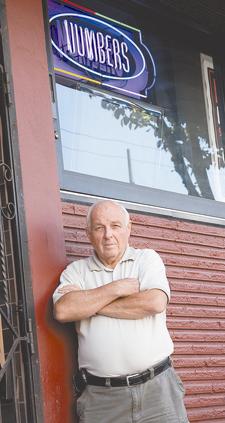The lone Vancouver queer bar using the controversial BarWatch system will continue to collect patrons’ personal information at the door for now.
That news comes even though the provincial information and privacy commissioner ruled last month that another bar violated provincial regulations with the same practices.
Under the BarWatch program, some clubs, such as Numbers on Davie St, have been swiping patrons’ driver’s licences and taking digital photographs of them so that if someone gets out of line, the club has the information which can be handed to police to apprehend troublemakers.
On Jul 24, BC’s information and privacy commissioner David Loukidelis ruled that the Personal Information Protection Act (PIPA) does not allow a bar to force its customers to give up too much of their personal information as a condition of being allowed into the bar. The Act governs the collection, use and disclosure of personal information by businesses.
The ruling came after a patron at the Wild Coyote Club in south Vancouver was asked for his driver’s licence to be scanned and for his picture to be taken with a digital camera. The patron complained that bar staff did not give him a reasonable explanation for the request.
PIPA says a business “must not, as a condition of supplying a product or service, require an individual to consent to the collection, use or disclosure of personal information beyond what is necessary to provide the product or service.”
Loukidelis ruled the Wild Coyote Club had gone beyond that.
But he also ruled that bars could collect personal information of banned customers for safety reasons and invited club owners to meet with him to find a workable solution to meet that objective.
Numbers Cabaret owner Phil Moon says his business will continue scanning licences and taking photos.
He says it’s a matter of safety.
“You don’t want people getting beaten up or shootings,” Moon says. “We’re not worried about good people; just the bad guys.” But, Loukidelis says, his ruling has implications some bars might not appreciate.
“Some folks seem to think it’s business as usual, that they don’t need to get onside with BC’s privacy law. This decision has implications for all bars in BC,” he says.
But BarWatch chairperson John Teti says the ruling applies only to The Wild Coyote Club because of the complaint against it.
He says Loukidelis’ comment that it affects all bars is only his interpretation. And, he adds, Loukidelis can only make an order about the way a business operates if a complaint is laid against that bar.
Moon agrees that Loukidelis’ ruling applies only to the Wild Coyote Club.
Numbers took a lot of heat when it began scanning licences and taking photos. Many community members swore not to return.
But, says Moon, “it’s just something people are going to have to get used to.”
He says the reason the pictures are taken is so the bar can see that the person is the same as the person whose information is contained in the magnetic coding on the ID card rather than an altered image on the front.
“It’s one of the best things we’ve done,” Moon says. “All I want to do is have a safe place to go to.”
But both Moon and Pulse and PumpJack owner Vince Marino say all BarWatch members are willing to work with Loukidelis to make sure the program complies with the law.
“You got to see what works and what doesn’t,” Marino says.
“We want to come to an agreement, and we’re working toward [an] end [Loukidelis] doesn’t object to.”
Meanwhile, an Aug 21 media release from the privacy commissioner’s office indicates that TreoScope Technologies, a Vancouver-based software company, held “collaborative discussions” with Loukidelis to find a solution that preserves patron privacy while ensuring safety at bars.
According to the release, a Treoscope system, EnterSafe, enables bars to collect the name, photograph, date of birth and gender of bar customers, but that information can be held for no more than 24-hour period. After that, the customer information is completely destroyed, the release stated.
With that period, if a customer is found to be “violent or otherwise undesirable,” the information can be kept and shared with other bars.
“This means only information necessary to identify the bad apples will be kept and that’s good for all other bar customers,” Loukidelid said in the release.
Moon says Numbers customers won’t be noticing any changes.“I’m told it’s going to be compulsory for the entire province,” Moon says. “Everything will be he same. It’ll make everything the same for everyone.”

 Why you can trust Xtra
Why you can trust Xtra


